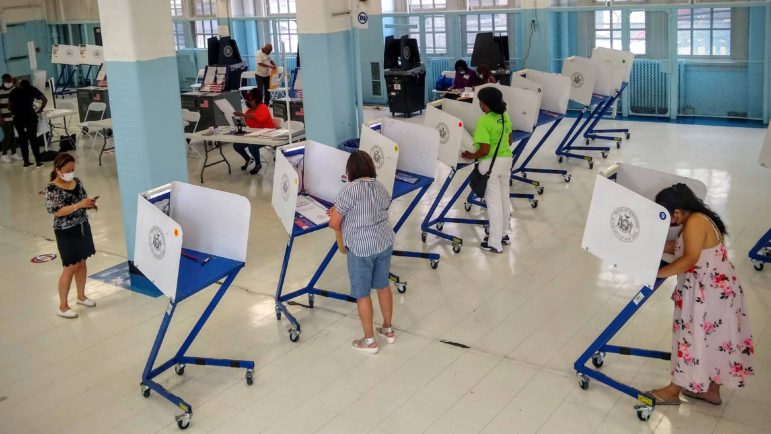“We must encourage our communities to vote, knowing politicians can make life-altering decisions that impact issues important for all Americans, specifically in our work for racial equity.”

Adi Talwar
Voters at M.S. 80 at 149 East Mosholu Parkway in the Bronx.The 2022 general election is less than a week away and yet many Americans continue to be apprehensive about voting. Given the tremendous debate on voter fraud and ongoing allegations of irregularities and other forms of election misconduct, many communities such as the Hispanic/Latino population are not only apprehensive but strongly believe their vote will not make an impact.
According to the Pew Research Center, an estimated 34.5 million Hispanic Americans are eligible to vote this year, making Latinos the fastest-growing racial and ethnic group in the U.S. electorate since the last midterm elections, increasing by 4.7 million since 2018. This represents 62 percent of the total growth in U.S. eligible voters during this time. And although these numbers are impressive, many Black and Brown communities are still wary of voting and are convinced their vote will not have influence. These thoughts manifest as not seeing themselves reflected in justice reform.
Recently, I have been re-reading the “Letter from Birmingham Jail” by Dr. Martin Luther King, and it seems like we are back in the 1960s when it comes to advances that we have made as it pertains to racial justice, criminal justice, and women’s rights. If we do not show up to the ballot box, how can we fight to ensure our rights are not being rolled back constantly every single day. So, what can we do?
As a Chicana feminist, I have worked on issues of civil rights including mass incarceration, women’s rights and gender equity, violence prevention, racial healing, and community policing. I am aware of the dynamics of the Latine community and not only on our resistance to vote, but alternately on the importance of using our voice, and how it can be effective. As the CEO of The Gathering for Justice, which focuses on intergenerational relationships, I know how important it is for people who are of the age to go out and vote.
Who we elect to office has an impact on local issues. These are the decision makers for things like what resources schools get for things like books, and if police officers are present in school buildings. And we should consider the implications for criminal justice reform: There are initiatives such as California Proposition 20 that address prison expansions and laws on “Raise the Age”—yet some states continue to prosecute young people as adults or automatically, determine that the incident is a crime, and youth should go to an adult court. People often think that decisions are made on a federal level when they are made on a local level; examples may include decisions to enforce an abortion ban or to block policies on gun control and student-loan forgiveness. We need to consider all this when we go to the polls.
An estimated 80 million eligible voters did not participate in the 2020 election. Statistics such as the 23 percent that said they were not interested in politics or the 20 percent that did not like the candidates, or the 16 percent that felt like their votes would not have influence—all these numbers concern me.
We must talk about elections and the issues. There will be severe implications around not showing up to the ballot box, but if you are somebody who is disenfranchised and cannot vote, there are still things that you can do, and things to consider:
- Educate your community, share your voting priorities with your family. It is important for young people to show up, not just for criminal justice reform, but for women’s rights, for the LGBTQIA+ community, and more.
- Educate people on how the government can serve everyone more effectively and address the history of exclusion in the process.
We must drive awareness and educate our networks, our friends and family about the impact of not voting and the harm that occurs, which can significantly impact vulnerable populations, such the Black and Brown, Latine, Indigenous, and Asian-American populations. We must encourage our communities to vote, knowing politicians can make life altering decisions that impact issues important for all Americans, specifically in our work for racial equity.
Even if you are not 18, you can still participate in the election process. You may not be able to walk into a voting booth, but there are things you can do to get involved:
- You can read up on political issues and figure out where you stand.
- You can still voice opinions on social media, in your school or local newspaper, or other public forums. You never know who might be listening.
- You can volunteer, your work can help get candidates elected, even if you are not able to vote yourself.
Raise your voice, show up, gather your friends and family, and ensure they vote on Nov. 8. We need you.
Carmen Perez-Jordan is the President and CEO of The Gathering for Justice.









One thought on “Opinion: If We Don’t Show Up to Vote, We Won’t Be Heard”
Even if you are unable to vote personally, you may still volunteer and campaign to elect politicians.